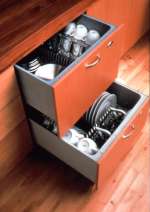Search engine visitors - click here to access entire "$ensible Home" web site
Click here to see a descriptive illustration of several super-quiet dishwasher designs.
Related links - DIY Appliance Maintenance Guides
Dear Jim: Our dishwasher is about 10 years old and seems to get louder each year. I also have to prerinse the dishes first or they don't get clean. Are the new "intelligent" dishwashers quieter and more efficient? - Paula N.

A: Many new dishwashers are not only intelligent, but they are much quieter. Some major appliance manufacturers told me their best models are more than 55 percent quieter than their best ones made 10 years ago. Some even need a status light so you can tell the dishwasher is running.
The cleaning process is also improved with some models having five spraying levels to reach every dish. A cleaning standard many new dishwashers are tested to requires 10 place settings covered with egg yolk, oatmeal, tomato sauce, etc. which is dried on for two hours to be cleaned without prerinsing.
"Intelligent" dishwashers are ones which sense how dirty the dishes are and automatically run the proper number of cycles at the proper temperature to clean them. The controls on intelligent dishwashers also allow you to override the automatic setting and select any cycle you wish.
These dishwasher sense the turbidity (cloudiness) of the wash water to determine when the dishes are clean and no more cycles are needed. Some designs shine a beam of light through the water. A photo sensor determines when the water is clear enough indicating no more food is coming from dirty dishes.
Another method uses a very sensitive pressure switch in the circulation system. When the water is still dirty, tiny food particles build up on the filter screen which increase the pump pressure. An electronic brain starts a brief flush cycle and then cleans more until the pressure indicates no more particles.
The energy efficiency of dishwashers is primarily a function of the hot water usage and how long they run. The level of sound insulation, which will also keep the water warmer, will benefit the overall efficiency. Letting the dishwasher automatically select the wash cycle is usually best.
The most energy efficient models use a two-pump design. This uses separate smaller wash and drain pumps which require a smaller water reservoir. One-pump designs reverse the pump rotation to switch from wash to drain. These are less expensive to make, but the larger pump requires a larger reservoir.
Another efficient option for small families are mini dishwashers (called dishdrawers) that mount one above another in any cabinet under the countertop. Use just one for small loads or both together for medium loads.
Delay-start is a convenient feature to run the dishwasher while you sleep. A built-in hard food grinder improves cleaning. Antibacterial cycles are good for families with children.
Instant Download Update Bulletin No. 578 - buyer's guide of the 17 most efficient and quietest dishwashers and dishdrawers listing water usage for normal cycle, number of pumps, descriptions of wash cycles and spary washing system, internal water heater and maximum temperature, internal food disposer options, convenient/sanitizing features, prices, and tips for dishwashing efficiency.
Dear Jim: I have read about some battery backup systems that can power an entire house for hours when the electricity goes off. They are constantly charged. Will this type of system really work and it is efficient? - Bob T.
A: I suppose it is possible to power your entire house from batteries and inverters to convert the electricity to alternating power, but it would require a huge quantity of batteries. It would not be cost effective.
If you want to power your entire house during power outages, you will need a large backup gas or diesel generator. Another option is a small battery backup system to power just a few essential electric items.